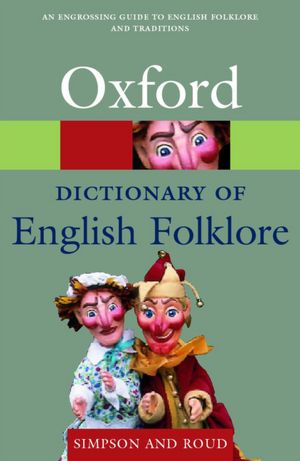A Dictionary of English Folklore book
Par morris douglas le mardi, novembre 10 2015, 22:41 - Lien permanent
A Dictionary of English Folklore. Jacqueline Simpson, Steve Roud
A.Dictionary.of.English.Folklore.pdf
ISBN: 9780191578526 | 0 pages | 4 Mb

A Dictionary of English Folklore Jacqueline Simpson, Steve Roud
Publisher: Oxford University Press, UK
Gardner seems to have first used it in print in . The following from the Oxford Dictionary of English Folklore (Oxford: Oxford University Press, 2000): Tin Can Band. See also A Dictionary of English Folklore, Jacqueline Simpson & Steve Roud, Oxford University Press 2000, pg. Use of the word in modern contexts traces to English folklorist Gerald Gardner (1884-1964), who is said to have joined circa 1939 an occult group in New Forest, Hampshire, England, for which he claimed an unbroken tradition to medieval times. According to the Oxford Dictionary of English Folklore:. Until recently, some dictionaries still gave the plural as oaves.myth 1830, from Gk. 'Friday the Thirteenth' in J Simpson ans S. Dorson, 'The Eclipse of Solar Mythology', in A. Mythos "speech, thought, story, myth," of unknown origin. Roud, A Dictionary of English Folklore, OUP, 2000, p.61; 36. Have you ever asked yourself “What would I do with a PhD in English folklore?” Katharine Briggs found her answer with Hobberdy Dick. Although some people claim that Halloween derives from the Pagan celebration of Samhain, in fact, All Hallow's Eve has no connection with that pagan celebration at all. Also see Funks and Wagnalls Standard Dictionary of Folklore, 1972, pg. Popular opinion might side with academic prejudice in thinking that there is hardly such a thing as English folklore, and certainly nothing worth studying--just a few superannuated old customs such as morris dancing.
The Artist's Guide to Drawing the Clothed Figure: A Complete Resource on Rendering Clothing and Drapery pdf
Solve Your Child's Sleep Problems pdf
Build Your Own Kit Car ebook
